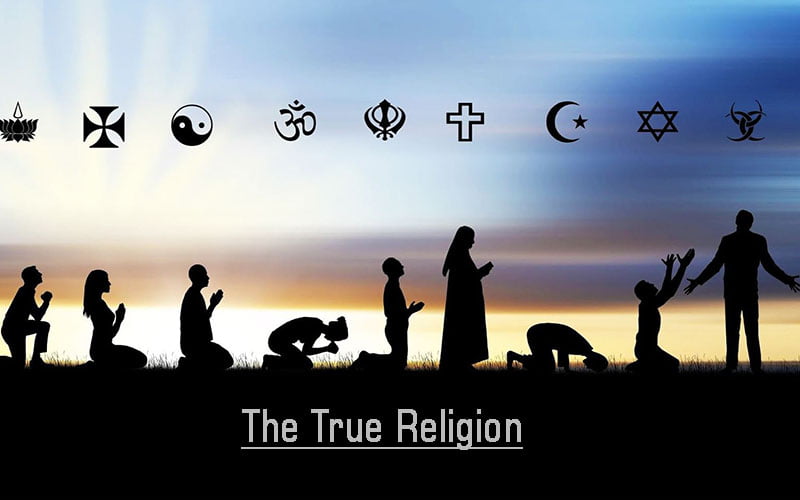
In a world filled with diverse belief systems, religion holds a significant place. It encompasses the core values, principles, and practices that guide individuals on their spiritual journey. This article aims to delve into the concept of true religion, examining its essence, importance, and impact on human lives. From the historical context to its modern interpretation, we will explore the various facets of true religion and its significance in contemporary society.
True religion goes beyond mere rituals and customs. It encompasses a deep connection between individuals and their faith, rooted in sincerity and devotion. It is not confined to a specific religious affiliation but rather transcends boundaries, emphasizing the universal principles of love, compassion, and morality. True religion fosters spiritual growth, inner peace, and a harmonious relationship with oneself and the world.
Embarking on a spiritual journey is a fundamental aspect of true religion. It involves seeking a higher purpose, understanding one’s existence, and forging a profound connection with the divine. Through introspection, meditation, and prayer, individuals navigate their inner world, gaining clarity and enlightenment. The spiritual journey is unique to each person, offering opportunities for self-discovery, personal growth, and a deeper understanding of one’s faith.
Throughout history, true religion has played a pivotal role in shaping civilizations and societies. Ancient cultures revered deities, practiced sacred rituals, and sought spiritual enlightenment. From the Egyptian civilization’s worship of Ra, the sun god, to the philosophical teachings of Confucius in ancient China, true religion has guided humanity’s quest for meaning and purpose.
As societies evolved, the concept of true religion adapted to changing times. In the modern era, religious pluralism and the rise of secularism have challenged traditional notions of faith. It is no longer confined to established institutions but is manifested in diverse ways, reflecting the individual’s personal beliefs and spiritual practices. It has become a dynamic and fluid concept that continues to shape the lives of millions worldwide.
Faith serves as a guiding force in the realm of true religion. It is a profound belief in the existence of a higher power or ultimate reality, despite the absence of empirical evidence. Faith provides individuals with a sense of security, hope, and resilience, especially in the face of adversity.
True religion manifests through diverse belief systems that span across cultures and civilizations. These belief systems offer a lens through which individuals interpret the world, giving rise to distinct practices, traditions, and rituals. Whether it is the monotheistic faiths of Christianity, Islam, or Judaism, or the ancient wisdom of Eastern philosophies like Buddhism and Hinduism, each offers a unique perspective on the nature of reality and the purpose of human life.
Spiritual practices form an integral part of true religion, serving as vehicles for personal growth and self-discovery. Meditation, prayer, contemplation, and mindfulness are among the many practices that allow individuals to cultivate a deeper connection with the divine and uncover their true nature. These practices enable individuals to transcend the limitations of the physical realm and explore the realms of consciousness and spirituality.
True religion places great emphasis on ethical conduct and moral values. It provides a moral compass that guides individuals towards living a righteous and virtuous life. Concepts such as honesty, compassion, justice, and forgiveness are not only valued within the realm of religion but also have a profound impact on societal harmony and individual well-being.
Community and fellowship play a vital role. It is within the context of a religious community that individuals find support, belonging, and a sense of shared purpose. Religious gatherings, congregations, and ceremonies provide opportunities for believers to come together, celebrate, and deepen their spiritual connections.
A: It is defined by the authenticity of one’s faith and the genuine pursuit of spiritual growth. It is not limited to any specific religious affiliation but transcends boundaries to encompass universal values such as love, compassion, and morality.
A: Yes, it is not contingent on formal religious affiliations. It is a personal journey that individuals undertake to nurture their spiritual connection, irrespective of their religious background or lack thereof.
A: It fosters personal growth by providing a framework for moral values, introspection, and self-improvement. It encourages individuals to cultivate virtues, develop empathy, and seek a higher purpose, leading to holistic development and inner fulfillment.
A: Yes, it promotes tolerance and acceptance by emphasizing the shared humanity of all individuals. It encourages respect for diverse beliefs and fosters harmonious coexistence in a multicultural world.
A: While some individuals may incorporate elements from various religious traditions into their spiritual practices, true religion is not about religious syncretism. It is a personal journey that aligns with one’s genuine beliefs and values.
A: Finding it is a deeply personal endeavor. It involves self-reflection, exploration, and a genuine search for meaning and purpose. Engaging in spiritual practices, studying sacred texts, and seeking guidance from trusted mentors can aid in the discovery of true religion.
True religion transcends the boundaries of formal institutions and dogmas. It encompasses the sincere pursuit of spiritual growth, fostering inner peace, and a harmonious connection with the divine. In a world characterized by diverse beliefs and practices, it unifies humanity through universal values of love, compassion, and morality. Embracing the essence it enables individuals to embark on a profound spiritual journey, nurturing personal growth, and enriching their lives.
Recommended other topics: Balance of Nature Reviews-The Secrets of Nature’s Harmony










© InfoDoot. All Rights Reserved.